- News
- Reviews
- Bikes
- Components
- Bar tape & grips
- Bottom brackets
- Brake & gear cables
- Brake & STI levers
- Brake pads & spares
- Brakes
- Cassettes & freewheels
- Chains
- Chainsets & chainrings
- Derailleurs - front
- Derailleurs - rear
- Forks
- Gear levers & shifters
- Groupsets
- Handlebars & extensions
- Headsets
- Hubs
- Inner tubes
- Pedals
- Quick releases & skewers
- Saddles
- Seatposts
- Stems
- Wheels
- Tyres
- Tubeless valves
- Accessories
- Accessories - misc
- Computer mounts
- Bags
- Bar ends
- Bike bags & cases
- Bottle cages
- Bottles
- Cameras
- Car racks
- Child seats
- Computers
- Glasses
- GPS units
- Helmets
- Lights - front
- Lights - rear
- Lights - sets
- Locks
- Mirrors
- Mudguards
- Racks
- Pumps & CO2 inflators
- Puncture kits
- Reflectives
- Smart watches
- Stands and racks
- Trailers
- Clothing
- Health, fitness and nutrition
- Tools and workshop
- Miscellaneous
- Buyers Guides
- Features
- Forum
- Recommends
- Podcast
TECH NEWS
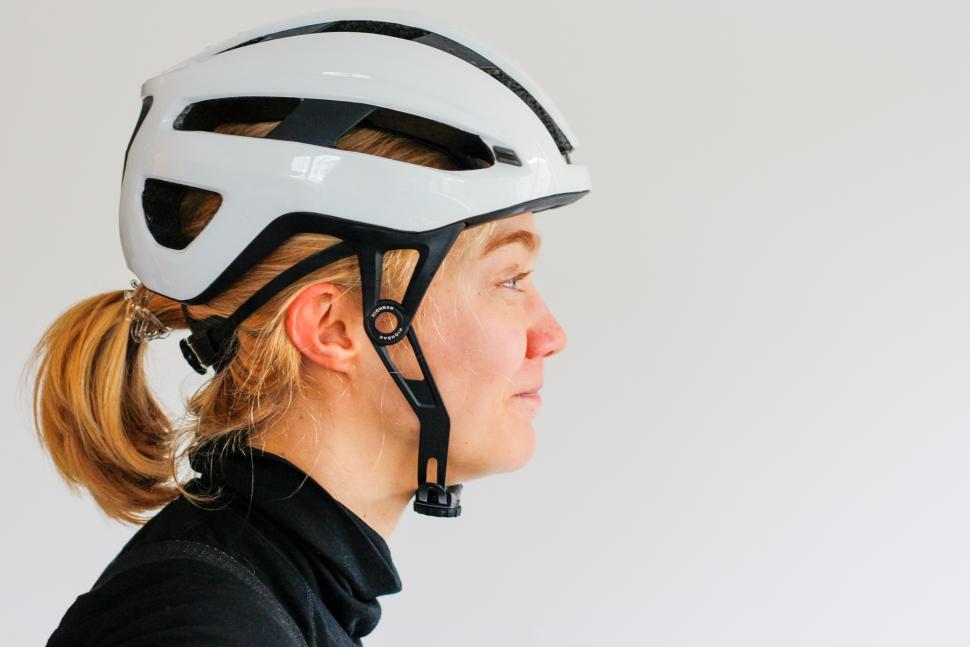 highbar helmet strap Suvi-1
highbar helmet strap Suvi-1Remember that mono-strapped Canyon helmet? We've tried out a prototype, and it's unlike any other bike helmet we've used before
The new helmet strap we spotted in February on the helmets of a bunch of Canyon-sponsored pro cyclists was a rather peculiar-looking invention, and there were no real details of it available back then, despite our efforts to pin down its origins. But after tracking down the folks behind it, we managed to get our hands (and heads) on the new helmet strap system called HighBar. We've got the details of the design to share, and you can read about how the system feels in real life further down.
According to HighBar - the US brand behind the strap system - its main aim with the new strap is to make bike helmets even safer. Yet, the brand has also listed a bunch of performance gains, claiming it's more aero and even less noisy than lids with more traditional strap systems. HighBar also says it can back this up with results from wind tunnel and CFD (Computational Fluid Dynamics) tests.
What's the 'mono-strap' all about?
Much of what HighBar is about is visible to the eye; it's a helmet strap system comprising a curved arm on each side of the helmet, connected together by an undetachable strap under the chin. The side arms are integrated into the helmet shell and connected by a retention system that also runs inside the helmet's internal shell. Despite the semi-rigid nature of the arms, they could be replaced in case of an incident (impacting only the strap, not the full helmet). We're told you'd have to go to your helmet brand of choice directly to arrange this.
The HighBar system is very unlike the traditional Y-strap design, and as it's integrated into the helmet, that means you cannot simply swap it onto your existing helmet. There are two sizes available: small and medium, though the difference between the two isn't too noticeable. Where the arms sit depends on the size of the helmet they've been installed into.
Contrary to what we speculated in February, the mono-strap system on the helmet is not connected to a regular strap at all, but instead to a softer, plastic strap that has a ratchet dial in the middle. The strap is more of a bar, which you pull down when putting the helmet on and it cannot twist too far back even when the helmet is not on your head.
How do you get the helmet on, then? Well, the chin bar pivots up to just below the front area for putting the helmet on and off, and once you're ready to go, you just tighten the 'bar' below the chin.
The retractable chin strap is perhaps best visualised in the patent document HighBar filed for the design back in 2021.
Why create a new helmet strap?
Though we might not pay much attention to them, as I was told more about HighBar and its quest to "revolutionise" helmets it is easy to see helmet straps are something that hasn't really changed for years, if not even decades. Fair enough, we get new helmet colourways and multi-directional impact protection (such as Mips, Kineticore, and WG11), but there is little going on with the straps of the helmets – in fact, when you look at helmet product images, they usually show just the top helmet with no straps.
When speaking to HighBar, we were told that despite the apparent performance focus of the retention system, the company aims to really make helmets safer for everyone. And for that to happen, they need to be worn properly.
"In the helmet lab test setting, helmet effectiveness is based on ideal conditions, and a helmet’s maximum protection is achieved when the helmet is correctly positioned,” HighBar said.
Being an ingredient brand, HighBar could be adopted by any helmet manufacturer, and that is what it needs to achieve before bringing the system to the heads of regular consumers.
But as mentioned, HighBar claims quite a few more benefits to the system than just simply keeping your helmet securely on your head.
In terms of aero savings, the brand said its retention system saves you 7 watts in power output if you're riding at 50km/h (we can dream).
The acoustic testing showed a 6-7.5 decibel advantage – for reference, 10 decibels is considered to be twice as loud. Though not all of us will have considered this or be too bothered, noise from helmet straps is a real thing, and there are already products such as WindBlox aimed at reducing that – so if HighBar lives up to its claims, it could perhaps make the ears of many riders a bit happier.
The brand also conducted thermal testing and said that the HighBar-equipped helmet showed a 4.8°C thermal advantage in the strap area compared to a helmet with webbing straps.
The whole system is made with proprietary bio-based nylon, which might seem counter-intuitive in terms of comfort, but then HighBar says it's quite a lot more hygienic than the fabric straps that (let's admit it) none of us really wash, meaning we have some minging old sweat rubbing on our heads on our rides.
What about glasses over straps?
As we correctly saw in the first pictures of the helmet, it does not allow you to wear your sunglasses on top of the straps. The attachment's solid nature means glasses simply won't grip the material, and that means the glasses have to go underneath.
There is quite ample space for that, though sunglass brands might need to rethink their branding as the side arms effectively block the branding on most shades.
Only for roadies?
Though we've not seen the HighBar applied to branded helmets or at downhill mountain bike circuits, the brand's patents include different applications for the system, including full-face mountain bikes and even general safety helmets.
Just last weekend, the Canyon Cllctv rider Luca Schwarzbauer took a second spot at the UCI World Cup XC short track race wearing a HighBar-equipped helmet, and of course, it's already been seen plenty on the gravel tracks.
How does it feel?
I had a chance to test the HighBar on a ride, and it is certainly unlike anything that I've come to associate with cycling helmet straps. The way the chin bar sits up on the forehead before it's flicked down to sit below the chin somehow makes me think of an ice hockey helmet with a visor, and flicking the bar down has a "game on" vibe to it.
And despite the strap looking a little clunky and alien, it is effective in what HighBar is aiming to do; it is very, very hard to wear the helmet the wrong way, which arguably automatically makes it safer. The closure system feels at first somewhat cumbersome, but I'd say this is only because it's different. The strap and buckle system is what I've been familiar with since I first learnt to ride a bike, and HighBar is something new and different.
I assumed the sidebars would sit very close to the ears, and perhaps even affect my peripheral vision, but that was not the case. Once on and the bar down and secured below the chin, I could not see any part of the strap and certainly didn't feel any different.
That's not really a surprise, as the internals of the prototype helmet equipped with HighBar were very much what any current helmet is. There's a Mips liner for added safety, and that's about it.
When it comes to performance, I cannot say whether the claims about the system being quieter or more aero are accurate - with near-horizontal rain and gusty winds on my test ride, it was hardly a day to tell whether something was quiet or not. What I can tell, though, is that the airflow around the ears was a lot better than with the conventional straps, and I can see that on high-speed descents the semi-rigid structure is quieter than fabric straps which can easily flap around, especially if not worn snug enough.
It's also easy to see that this design takes away the faff of adjusting the straps around the ears in the first place. You can put on the helmet and tighten the strap easily with one hand, and because you cannot tinker with the length of the sidebars, it's more likely you'll have the helmet sitting properly level on your head instead of leaning to one side or another.
It also doesn't interfere with glasses or bone-conducting headphones nearly as much as I'd thought it would (you can see the gap between the arms and ears quite clearly in the picture above).
Whether HighBar is going to revolutionise helmets as we know them, only time will tell. And once we start to see this on the heads of pro roadies and have the first helmet brands adopt the system - with Canyon being the first - then it's bound to force helmet designers to think twice if the existing strap designs really serve the purpose still.
With HighBar saying it already complies with all international helmet safety standards, it's hard to see it taking too long before we start more than one bike helmet brand developing a helmet with the HighBar system available for consumers.
Latest Comments
- Rendel Harris 12 sec ago
How can you know that you are "equally fearful" as "any female cyclist"? There is no possible way of quantifying such emotions and female cyclists...
- chrisonabike 32 min 11 sec ago
I think it would be fairer to blame the moon - as in "my client is a loony".
- Bungle_52 55 min 36 sec ago
Nice idea but Gloucestershire Constabulary are not interested as exemplified by this prvious NMOTD. Not only was there NFA for the close pass in...
- quiff 1 hour 41 sec ago
The war years would work - 1917 (39 mill) or 1942 if you're rounding up (44 mill). Buy yes, it's been an upward trajectory since then.
- mctrials23 1 hour 7 min ago
Flippin heck!
- hawkinspeter 2 hours 27 min ago
I think black boxes are great for early detection of cognitive decline and/or sight problems. Someone's driving is going to become much less smooth...
- Bigtwin 3 hours 3 min ago
It's a fashion. https://guildford-dragon.com/shalford-driver-who-smashed-shalford-war-me...
- MTL Biker 3 hours 23 min ago
Robin Phans .....
- Rendel Harris 5 hours 4 min ago
Well it would be irresponsible enough if there were only cars and buses, if there are going to be "cars, buses and traffic" that's just suicidal...
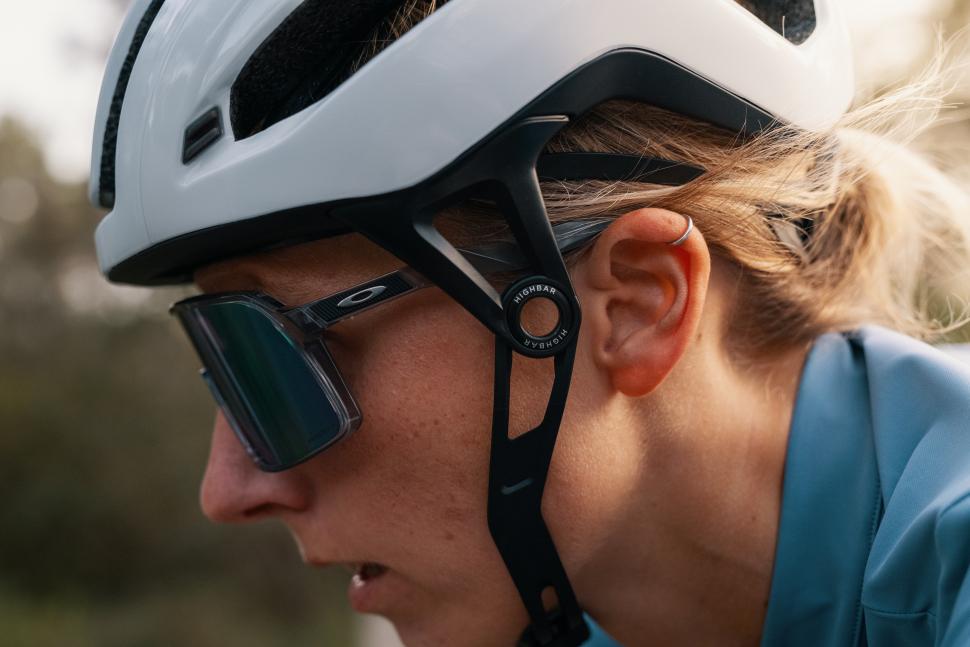
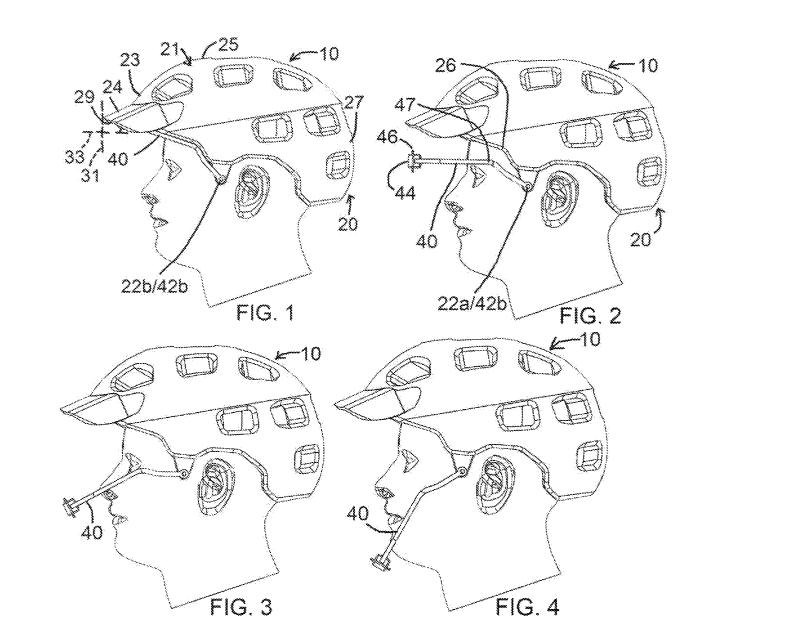
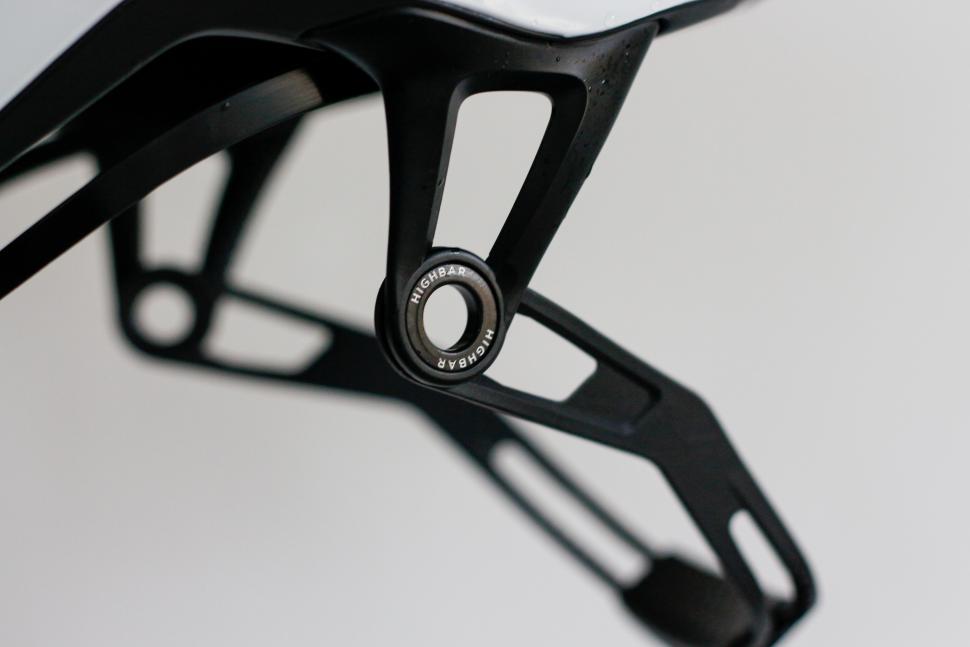
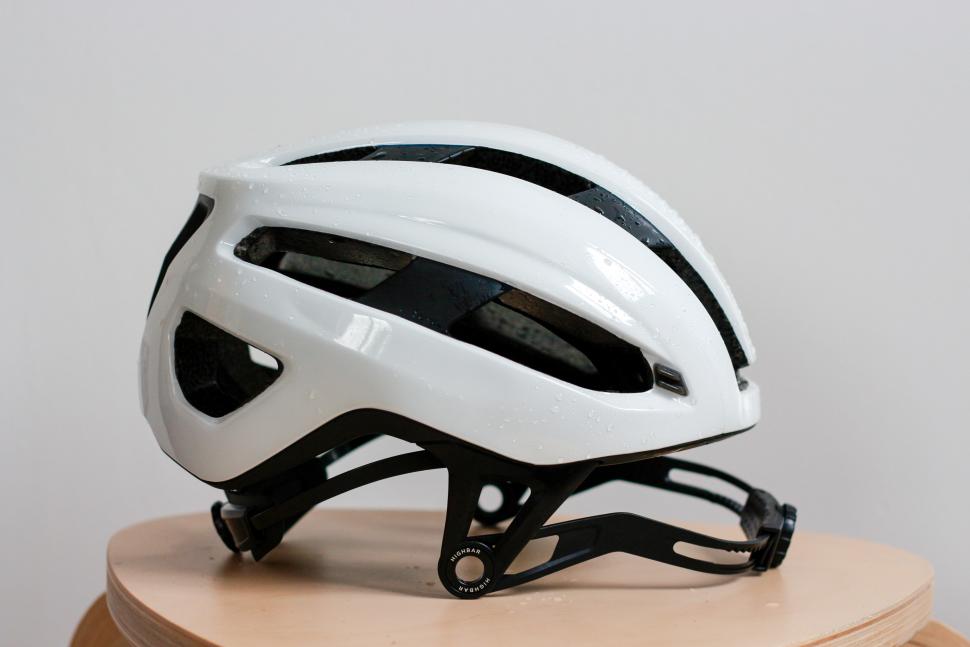
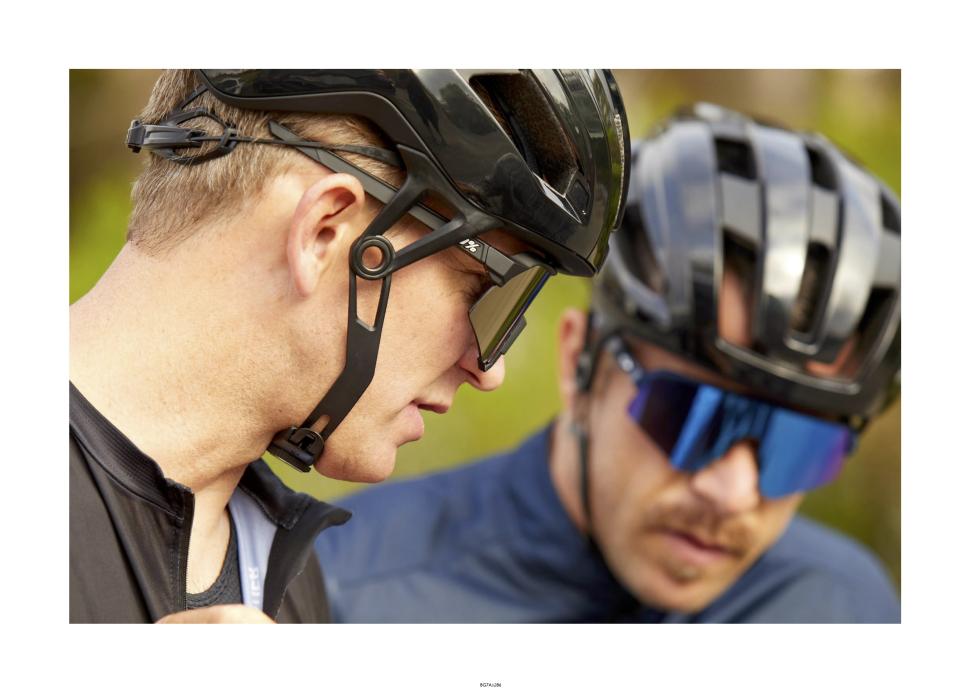
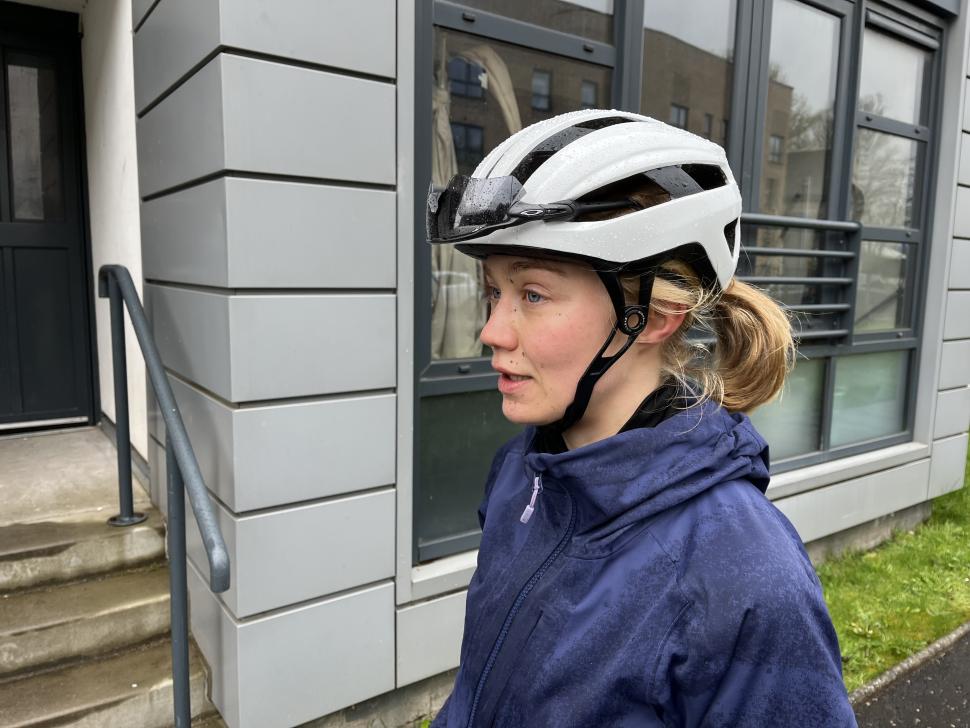
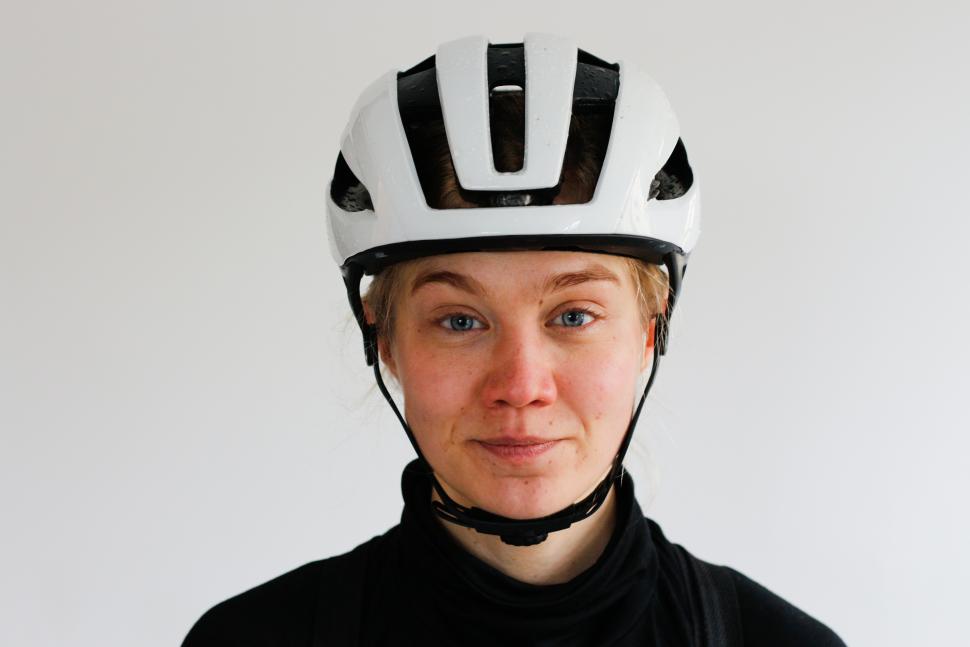
Add new comment
11 comments
I think it looks great, could see it going well with some Oakley Jawbreakers.
I'd be 100% in favour of the idea if it could stop people wearing their helmet tipped right back like some sort of Burberry-wearing chav in a baseball cap, limiting its protective qualities.
I think the sunglasses over the straps safety claim is more of a smokescreen in the name of cycling fashion, much the same as non-racers shaving their legs for speed or ease of massage when they don't have a personal masseur! (Though I do agree it's easier to clean abrasions and cuts).
This looks like a potentially useful innovation - particularly for kids helmets.
I'm forever adjusting the straps on kids helmets as they never stay put - here's looking at you Lazer and Met helmets 🤬
I thought the rationale for wearing sunglasses over rather than under the helmet straps was so they could fly off in a crash and not stay around to cut up your face, how does this fit with that?
Nope, it's to keep your straps down and quieter. Plus most sunglasses are polycarbonate and aren't going to shatter like glass anyway
I understood that traditional helmet strap clips had quite a low breaking strength so that if you got twisted/tangled in a crash they would break before your neck did. It will be interesting to see if this has similar.
Never heard that. Downhill and motorbike helmets have metal D rings on straps that are riveted into the shell. Helmet straps breaking under load doesn't sound like a good idea. I assume plastic clips on road helmets are just for weight and convenience.
If there is such a design criterion, surely it will be in the DOT/Snell/BS etc. tests they'll subject it to.
They should get it product tested by BoJo - if it sits correctly on his head it's a winner.
Only if you're using him to replace the force sensors in an impact test
Those photos of Johnson deliberately wearing helmets badly always remind me of what Hunter S. Thompson wrote in his obituary of Nixon:
"He was a swine of a man and a jabbering dupe of a president. Nixon was so crooked that he needed servants to help him screw his pants on every morning."